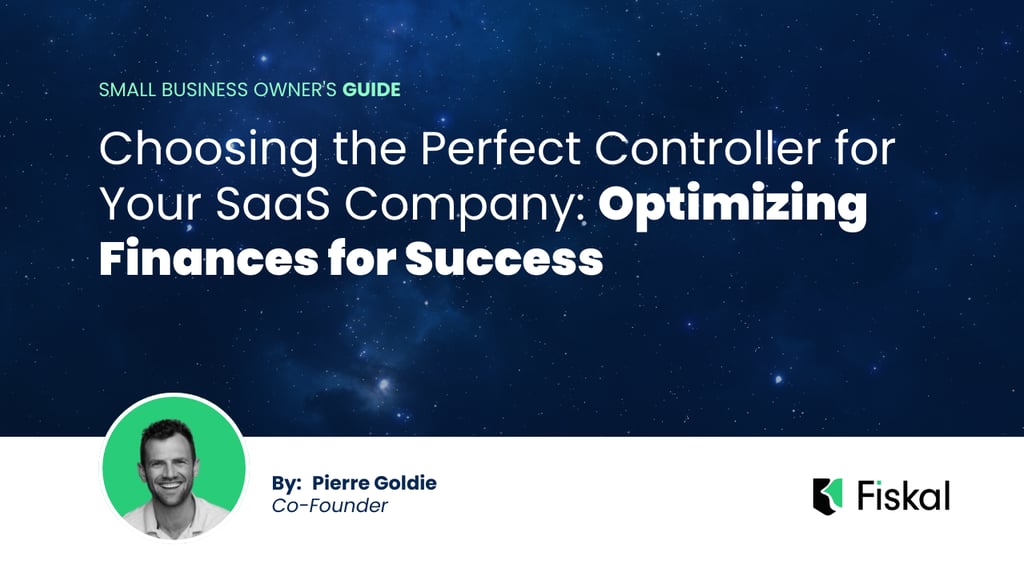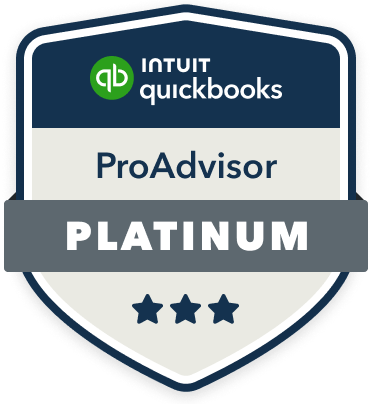Choosing the Perfect Controller for Your SaaS Company: Optimizing Finances for Success
Are you a SaaS company owner searching for the perfect controller who can optimize your finances for success? Look no further! In this article, we will guide you through the essential factors to consider when choosing a controller for your SaaS company. From expert financial knowledge to tech-savviness, we will explore the skills and qualities that make a candidate stand out in this competitive field. Having a controller who understands the intricacies of the SaaS industry is crucial for ensuring the financial stability and growth of your company. They will play a key role in managing your revenue streams, monitoring costs and providing accurate financial reporting. Additionally, a qualified controller will also develop and implement effective financial strategies to improve profitability and streamline operations. With our step-by-step guide, you will gain valuable insights into the hiring process, including how to define your requirements, where to find top talent, and what questions to ask during interviews. By the end of this article, you will be equipped with the knowledge and confidence to choose the perfect controller who will lead your SaaS company to financial success. So let's dive in and optimize your finances for growth!
SYSTEMS AND SOFTWARE


Understanding the importance of financial optimization for SaaS companies
The success of any SaaS company is largely dependent on its financial health and stability. As a SaaS business owner, you need to ensure that your finances are well-managed, costs are optimized and revenue streams are maximized. This is where the role of a skilled controller becomes crucial.
A controller is responsible for overseeing the financial operations of your SaaS company, ensuring accurate financial reporting, and developing strategic financial plans to drive growth. By hiring the right controller, you can unlock the full potential of your SaaS business, making informed decisions and achieving your financial goals.
Financial optimization is particularly important for SaaS companies, as they often operate in a highly competitive and rapidly evolving market. SaaS businesses need to be agile, responsive and able to adapt to changing market conditions. A skilled controller can help you navigate these challenges, identify cost-saving opportunities and implement strategies to improve profitability and cash flow.
Different types of controllers for SaaS companies
When it comes to choosing a controller for your SaaS company, you have several options to consider. The most common types of controllers for SaaS businesses include:
In-house controller: An in-house controller is a full-time employee who is solely dedicated to managing the financial operations of your SaaS company. They are deeply integrated into your organization and have a comprehensive understanding of your business, its processes and its financial needs.
Outsourced controller: Alternatively, you can choose to outsource your controller functions to a specialized accounting or finance firm. Outsourced controllers offer a more flexible and cost-effective solution, as you can scale their services up or down as needed.
Fractional controller: A fractional controller is a part-time or on-demand professional who provides controller services to multiple clients. This option can be particularly beneficial for smaller SaaS companies that don't require a full-time controller.
Each type of controller has its own advantages and disadvantages, and the best choice for your SaaS company will depend on factors such as your company's size, complexity and financial needs. It's important to carefully evaluate the pros and cons of each option to determine the most suitable approach for your business.
Key factors to consider when choosing a controller
When selecting a controller for your SaaS company, there are several key factors to consider:
Industry experience: Look for a controller who has significant experience working with SaaS companies or in the technology industry. They should have a deep understanding of the unique financial challenges and opportunities that SaaS businesses face.
Technical expertise: In addition to financial acumen, your controller should be tech-savvy and comfortable working with the various software and tools used in your SaaS operations, such as accounting software, financial modeling tools and data analytics platforms.
Strategic thinking: A great controller should be a strategic thinker, able to analyze financial data, identify trends and develop innovative solutions to optimize your company's finances.
Communication skills: Effective communication is crucial for a controller, as they will need to collaborate with your executive team, provide financial reporting to stakeholders and explain complex financial concepts to non-financial personnel.
Adaptability: The SaaS industry is constantly evolving, so your controller should be able to adapt to changes in regulations, industry practices and your company's needs.
Attention to detail: Accurate financial reporting and meticulous record-keeping are essential for the success of your SaaS business. Your controller must have a keen eye for detail and a commitment to accuracy.
By carefully considering these factors, you can ensure that you hire a controller who is the perfect fit for your SaaS company and can help you achieve your financial goals.
The role of a controller in optimizing finances for success
The role of a controller in a SaaS company is multifaceted and essential for financial optimization and overall success. Here are some of the key responsibilities and contributions a controller can make:
Financial reporting and analysis: A skilled controller will be responsible for producing accurate and timely financial reports, such as balance sheets, income statements and cash flow statements. They will also analyze this data to identify trends, uncover insights, and provide recommendations to the executive team.
Budgeting and forecasting: Controllers play a crucial role in developing and managing the company's budget, as well as creating accurate financial forecasts to support strategic decision-making. They can help you anticipate cash flow needs, plan for future investments and ensure the financial stability of your SaaS business.
Cost management: Controllers are responsible for closely monitoring and optimizing your company's expenses, identifying cost-saving opportunities and implementing strategies to improve profitability.
Revenue recognition: In the SaaS industry, revenue recognition can be complex due to subscription-based pricing models and other unique factors. Your controller will ensure that your revenue is recognized accurately and in compliance with relevant accounting standards.
Compliance and risk management: Controllers are responsible for ensuring that your SaaS company adheres to all relevant financial regulations and accounting standards. They will also help you identify and mitigate financial risks, such as fraud, cybersecurity threats and regulatory changes.
Strategic financial planning: A skilled controller can contribute to the overall strategic direction of your SaaS company by providing financial insights, modeling different scenarios and helping to develop long-term financial plans that support your growth objectives.
By leveraging the expertise and guidance of a well-qualified controller, you can optimize your SaaS company's finances, improve decision-making and position your business for sustained success.
Essential skills and qualifications to look for in a controller
When searching for the perfect controller for your SaaS company, it's important to look for candidates who possess a specific set of skills and qualifications. Here are some of the essential attributes you should prioritize:
Accounting and financial expertise: Your controller should have a strong background in accounting, with a deep understanding of generally accepted accounting principles (GAAP), financial reporting and financial analysis. They should also be proficient in using accounting software and financial modeling tools.
SaaS industry knowledge: Ideally, your controller should have experience working with SaaS companies or in the technology industry. They should be familiar with the unique financial challenges and best practices associated with subscription-based business models.
Data analysis and problem-solving skills: A successful controller must be adept at analyzing financial data, identifying trends and using their analytical skills to develop solutions to complex problems.
Technical proficiency: In addition to financial expertise, your controller should be tech-savvy and comfortable working with a variety of software and tools, such as accounting software, business intelligence platforms and cloud-based applications.
Strategic thinking: The best controllers are not just number crunchers; they are strategic thinkers who can help you align your financial strategies with your overall business objectives.
Strong communication skills: Effective communication is crucial for a controller, as they will need to present financial information to stakeholders, collaborate with cross-functional teams and explain complex financial concepts to non-financial personnel.
Adaptability and continuous learning: The SaaS industry is constantly evolving, so your controller should be adaptable, open to learning and willing to stay up-to-date with the latest trends, regulations and best practices.
By prioritizing these essential skills and qualifications, you can ensure that you hire a controller who will be a valuable asset to your SaaS company and help you achieve your financial goals.
How to conduct a thorough evaluation of potential controllers
Choosing the right controller for your SaaS company is a critical decision that requires a comprehensive evaluation process. Here are the steps you should take to ensure you select the best candidate:
Define your requirements: Start by clearly defining the specific skills, experience, and qualifications you are looking for in a controller. This will help you create a detailed job description and evaluate candidates more effectively.
Conduct a thorough review of resumes and portfolios: Carefully review the resumes and portfolios of potential candidates to assess their relevant experience, educational background, and technical skills.
Assess technical proficiency: Depending on the specific requirements of your SaaS company, you may want to conduct technical assessments or ask candidates to complete a case study or coding challenge to evaluate their proficiency with financial software, data analysis tools and other relevant technologies.
Evaluate problem-solving and strategic thinking: During the interview process, ask candidates to discuss specific financial challenges they have faced and the solutions they developed. This will help you gauge their problem-solving abilities and strategic thinking skills.
Assess communication and collaboration skills: Observe how candidates communicate during the interview process, as well as their ability to explain complex financial concepts in a clear and concise manner. Also, assess their interpersonal skills and ability to work effectively with cross-functional teams.
Check references and conduct background checks: Reach out to the candidate's previous employers, colleagues, or clients to verify their work experience, achievements and professional reputation. Additionally, conduct background checks to ensure there are no red flags.
Consider cultural fit: Evaluate whether the candidate's values, work style, and personality align with your company's culture and the dynamics of your existing team.
By following this comprehensive evaluation process, you can be confident that you are hiring a controller who will be a perfect fit for your SaaS company and contribute to its financial success.
Best practices for onboarding a new controller
Once you have identified the perfect controller for your SaaS company, the next step is to ensure a smooth and effective onboarding process. Here are some best practices to follow:
Provide a comprehensive orientation: Begin by giving your new controller a thorough overview of your SaaS company, its history, products, services and key stakeholders. This will help them quickly understand the context in which they will be working.
Establish clear goals and expectations: Work with your new controller to define their specific roles and responsibilities, as well as the key performance indicators (KPIs) and metrics they will be responsible for monitoring and improving.
Introduce them to the team: Facilitate introductions between your new controller and the rest of your finance team, as well as any other relevant departments they will be working with, such as sales, marketing and operations.
Provide access to necessary tools and systems: Ensure that your new controller has access to all the financial software, data sources, and other tools they will need to perform their duties effectively.
Assign a mentor or buddy: Consider pairing your new controller with a more experienced member of your finance team who can serve as a mentor, answering questions and providing guidance during the onboarding process.
Schedule regular check-ins: Set up weekly or biweekly check-in meetings to discuss progress, address any challenges, and provide feedback to your new controller.
Offer ongoing training and development: Invest in your new controller's professional development by providing them with opportunities to attend industry events, participate in training programs or take courses that will enhance their skills and knowledge.
By following these best practices, you can ensure that your new controller is able to hit the ground running, quickly integrate into your SaaS company's operations and start contributing to the optimization of your finances.
Implementing financial optimization strategies with your controller
Once you have hired the perfect controller for your SaaS company, it's time to work together to implement financial optimization strategies that will drive your business towards greater success. Here are some key strategies to consider:
Streamline financial processes: Work with your controller to identify and eliminate inefficiencies in your financial workflows, such as manual data entry, redundant approvals or outdated reporting methods. By automating and optimizing these processes, you can improve accuracy, reduce errors and free up your controller's time to focus on more strategic initiatives.
Implement robust financial controls: Collaborate with your controller to establish a comprehensive system of financial controls, including internal audits, segregation of duties and regular reconciliations. This will help you mitigate risks, ensure compliance and maintain the integrity of your financial data.
Enhance financial reporting and analysis: Work with your controller to develop a robust financial reporting and analysis framework that provides you with timely, accurate and insightful information. This may include customized dashboards, key performance indicators and scenario-based forecasting.
Optimize revenue recognition and billing: Your controller should work closely with your sales and operations teams to ensure that your revenue recognition and billing processes are aligned with industry best practices and accounting standards. This will help you accurately track and report your SaaS company's revenue streams.
Leverage data-driven decision making: Encourage your controller to use data-driven insights to inform strategic decision-making, such as pricing adjustments, resource allocation and investment priorities. By combining their financial expertise with data analysis, your controller can help you make more informed and impactful decisions.
Implement cost-saving measures: Work with your controller to identify opportunities to reduce costs, such as negotiating better vendor contracts, optimizing resource utilization or streamlining administrative processes. This will help improve your SaaS company's profitability and cash flow.
Develop and monitor key financial metrics: Collaborate with your controller to define and track the most relevant financial metrics for your SaaS business, such as monthly recurring revenue (MRR), customer acquisition cost (CAC) and churn rate. These metrics will provide valuable insights to guide your financial strategies and decision-making.
By working closely with your controller to implement these financial optimization strategies, you can unlock the full potential of your SaaS company and position it for long-term success.
The benefits of outsourcing your controller functions
While hiring an in-house controller can be a valuable investment for many SaaS companies, there are also significant benefits to outsourcing your controller functions. Here are some of the key advantages to consider:
Cost-effectiveness: Outsourcing your controller functions can be a more cost-effective solution, especially for smaller or growing SaaS companies that may not require a full-time, in-house controller. Outsourced providers can offer their services on a flexible, as-needed basis, allowing you to scale your financial support up or down as your business needs evolve.
Access to specialized expertise: Outsourced controller providers often have a team of highly skilled and experienced financial professionals who specialize in working with SaaS companies. This can give you access to a deeper pool of expertise and specialized knowledge that may be difficult to find or maintain in-house.
Improved efficiency and productivity: Outsourcing your controller functions can help streamline your financial processes, reduce administrative overhead and free up your internal team to focus on core business activities. Outsourced providers often have well-established workflows and technologies that can enhance the efficiency and accuracy of your financial operations.
Scalability and flexibility: As your SaaS company grows, your financial needs and requirements will likely change. Outsourced controller services can easily scale up or down to meet your evolving needs, without the challenges of hiring, training and managing an in-house team.
Compliance and risk management: Outsourced controller providers are typically well-versed in the latest financial regulations, accounting standards and industry best practices. They can help ensure that your SaaS company remains compliant and mitigate potential financial risks.
Objectivity and strategic insights: Outsourced controllers can provide an objective, third-party perspective on your company's financial performance and strategies. This can lead to more informed decision-making and the identification of new opportunities for optimization and growth.
By carefully evaluating the costs, benefits, and tradeoffs of outsourcing your controller functions, you can determine the best approach for your SaaS company and unlock the financial optimization and success you seek.
Conclusion: Finding the perfect controller for your SaaS company
In the dynamic and competitive world of SaaS, having the right controller in place is essential for optimizing your finances and driving your business towards long-term success. By carefully considering the factors outlined in this article, you can identify and hire the perfect controller who will be a valuable asset to your SaaS company.
Remember, a great controller is more than just a numbers cruncher – they are a strategic partner who can help you navigate the unique financial challenges of the SaaS industry, implement cost-saving measures and develop innovative financial strategies to support your growth objectives.
Whether you choose to hire an in-house controller, outsource your controller functions, or opt for a fractional solution, the key is to find a candidate who possesses the right blend of financial expertise, technical proficiency and strategic thinking. By doing so, you can unlock the full potential of your SaaS company and position it for continued success in the years to come.
So, take the time to carefully evaluate your options, conduct a thorough hiring process and onboard your new controller with care. With the right financial leader in place, your SaaS company will be well-equipped to optimize its finances, enhance its profitability and thrive in the ever-evolving SaaS landscape.












